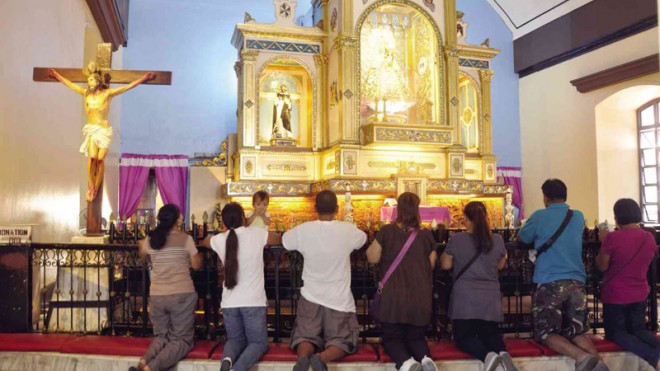
LENTEN RITUAL Devotees pray for intercession before the image of Our Lady of the Rosary of Manaoag in Pangasinan province, which is part of the traditional Visita Iglesia (church visits) among the faithful during Holy Week. WILLIE LOMIBAO/Contributor
MANAOAG, Pangasinan—On ordinary days, the image of the Our Lady of the Rosary of Manaoag wears a sky blue cape with matching secondary veil and apron.
But at the start of Lent, on Ash Wednesday, her vestment is changed to purple.
“Her dress goes with the color of the season. So, now, she wears a purple dress because that’s the color of Lent. It has a penitential character,” said Fr. Ronald Mactal, chaplain and liturgist of the pilgrimage site in Manaoag town, Pangasinan province.
On the night of Black Saturday, the Lady’s dress will be changed to either white or gold to symbolize Easter, a time for celebration.
“The Virgin Mary goes with us as we journey with our pilgrimage,” Mactal said.
Select group
The task of regularly dressing up and cleaning the more than 400-year-old image of “Apo Baket,” as devotees call her, is performed by a select group of church employees and volunteers.
“We follow a protocol. We dress her like a queen,” said Mactal.
“Every month, we would lower her at night from the altar through an elevator and at the sacristy at the back of the altar, we change or clean her vestments,” said Artist Glenn Lopez, 33, a volunteer.
A carpet is first laid out on the floor of the sacristy where the icon is brought down from the altar.
“Then we light a candle as a sign of veneration, then we pray. After that, we dress her up,” said Mactal.
Accessories—the crown, halo, rosary and scepter—are first removed and laid out on a table in the sacristy.
“Then we remove the vestments. First, we take out the second veil, then the cape and finally, the apron. We would dust them off. Then her face is cleaned and then, her jewels,” Lopez said.
Cleaning usually takes 30 minutes. But if the vestment is changed, it can take about an hour.
Always a new dress
“If we dress her for her feasts, it takes us more than three hours because she always wears a new dress for these occasions,” Lopez said.
New dresses from donors are worn during the town fiesta, on every third Wednesday of Easter (May 7) and during the Feast of Our Lady of the Rosary every Oct. 7.
“We already have a lineup of donors up to 2017. They have been pleading that they be given a chance,” he said. “There has to be a social dimension also. So when you donate, you have to also give something for the poor. I think the Blessed Mother will like this better because you are not only clothing her but also the poor.”
Some donations have intricate embroideries made of gold thread and cost a fortune. Donated dresses have been piling up. Mactal said experts from the National Museum had been consulted on what to do with them.
“Out of the 300 pieces, only 10 percent are of good quality. The rest, we can give them away. So rather than burn them, we cut them into small pieces and distribute them to the people who come here during the feasts,” said the priest.
He said that during Good Friday, people lined up at the back of the altar to touch the dress of Apo Baket.
Touch
“There’s a biblical passage that says that the people during the time of Jesus wanted to touch His cloak because just by touching it, they would be cured,” Mactal said.
“We have heard testimonies on the good things the vestment relic had done to them, either they were cured from their illnesses or something good happened to them. I was very happy about it,” he said.
“There have been many miracles. Some are being reported. We just do not want to highlight it. But people themselves, they are the ones doing it as witnesses. The miracle continues,” Mactal said.
RELATED STORIES
‘Virgin Mary’ draws hundreds of Malaysian Catholics
Crowds flock to Virgin ‘miracle’ tree in New Jersey